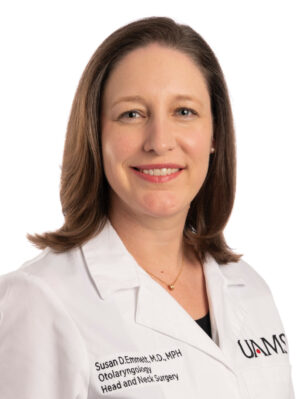By Linda Satter
The University of Arkansas for Medical Sciences (UAMS) Department of Otolaryngology – Head and Neck Surgery has established the Center for Hearing Health Equity, moving the university toward becoming a leader in research into hearing disparities worldwide.

Backed by NIH funding, the center focuses on understanding hearing health disparities and barriers to accessing hearing care, both in Arkansas and around the world.
Leading the center is Susan D. Emmett, M.D., MPH, an otolaryngologist and public health researcher who is the fourth-highest funded NIH investigator in the country in the otolaryngology field. She joined UAMS in May. Samantha Kleindienst Robler, Ph.D., Au.D., a clinical and research audiologist who is a national expert in telehealth, has joined Emmett at UAMS to serve as the new Center’s associate director.
Shortly after Emmett’s arrival at UAMS, where she is an associate professor in both the College of Medicine, which includes the Department of Otolaryngology, and the Fay W. Boozman College of Public Health, The Lancet Global Health Journal published findings from a landmark study led by Emmett and Robler. Known as the Hearing Norton Sound study, which focused on school-based hearing screening programs in rural Alaska from 2017 through 2020, Emmett and Robler showed that referring children to specialists via telemedicine provides significantly quicker access to follow-up care than referring them to primary care providers.
The randomized controlled trial, conducted in 15 rural Alaskan communities with the aid of funding from the Patient-Centered Outcomes Research Institute, is believed to be the first to demonstrate that telemedicine can reduce a key rural health disparity of access to care. Emmett says the findings have implications for rural areas everywhere and could lead to improved access to specialists for people with other preventable health conditions.
Emmett came to UAMS from Duke University School of Medicine in Durham, N.C., where she earned her medical degree in 2010 and most recently was an associate professor of surgery. Having earned her master’s in public health in epidemiological and statistical methods in 2014 from Johns Hopkins Bloomberg School of Public Health, Emmett was also an associate research professor of global health at Duke.
“As one of the most successful NIH-funded ENT surgeons in the country, she will help UAMS quickly become a leader in research involving hearing health disparities both in Arkansas and abroad,” said John Dornhoffer, M.D., chair of the department. “I am extremely excited to have been able to recruit a physician-scientist of her caliber.”
While Emmett spends some of her time seeing patients and performing cochlear implant surgery, her primary focus is on research into hearing loss disparities, in an effort to improve access to care for people, particularly children, in underserved areas. She wants to identify individuals who are either at risk of developing hearing loss or are already experiencing it but haven’t yet been diagnosed and help them access affordable preventive care and treatment.
“The center isn’t limited to children, but my heart lies with children,” Emmett said.
“Childhood hearing loss has a lifelong impact,” she said, citing effects on speech and language development, the ability to learn in school and eventually the ability to obtain a job. “But it can often be prevented if we identify the problem early and make sure children have access to the care that they need. To tackle this problem takes thinking about this from several different perspectives.”
The Center for Hearing Health Equity, the only center of its kind in the world, is the home to research conducted by two multicenter networks that Emmett runs. The Global HEAR (Hearing Loss Evaluation, Advocacy & Research) Collaborative is an international research network that includes a multidisciplinary group of investigators from 28 countries. HEAR USA, the United States branch of the collaborative, has six sites. Both are dedicated to reducing disparities in hearing loss across the country and worldwide.
Emmett moved her four NIH grants to UAMS from Duke. Three of them are HEAR Collaborative endeavors, including two ongoing randomized trials involving more than 20,000 children in about 100 schools in the Appalachia region of Kentucky and rural Alaska to develop a new model of telehealth-based preventive care. The trials stemmed from the work that was the subject of the June 15 Lancet article and highlight innovations being developed by Robler.
In the third HEAR Collaborative grant, Emmett and Robler are partnering with industry and academic partners in South Africa to develop an inexpensive mobile health tympanometer to screen for middle ear disease that is often a precursor to hearing loss. The cell phone–based screening device is being designed to be used by teachers and community health workers to screen children in schools instead of relying on audiologists with advanced degrees — a scarce resource in rural and underserved areas.
In addition, they have a cohort study underway on childhood hearing loss in Alaska to help determine why hearing loss is so common in Alaska Native children and to identify modifiable risk factors such as nutritional and environmental factors that could be addressed to reduce hearing loss moving forward.
“There is no standardized method across the country to screen children for hearing loss,” Emmett said, adding that even after rural children with hearing loss are identified, they often never receive the care they need.
“Our plan,” she said, “is to change that, and completely alter the paradigm for detecting hearing loss early and ensuring access to treatment. My goal is to eventually eliminate preventable childhood hearing loss through early detection and effective intervention.”
